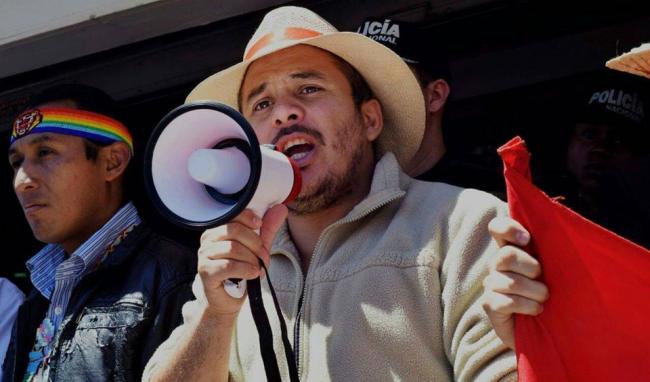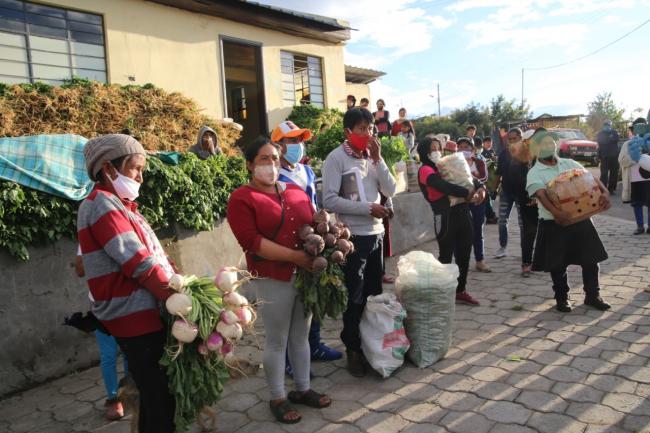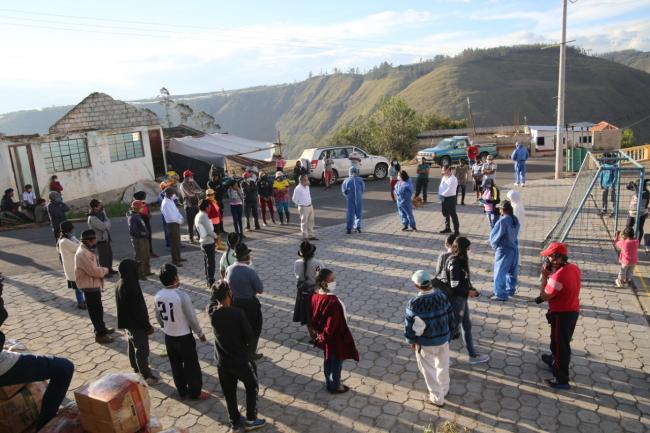
It looked like a timeless scene, as rural families from Ecuador’s highlands and lowlands lined up to engage in a money-less exchange of staple foods against the backdrop of the Andes mountains. Apart, that is, from a telltale sign that linked the image to a specific moment in time: All of the participants were wearing face masks. Amid the devastation and hardship caused by the coronavirus, reviving the ancestral custom of the trueque (food exchange) is just one way that Ecuador’s peasant communities are implementing food sovereignty as a response to the crisis and resistance against the failed neoliberal food model.
Ecuador has become the epicenter of Covid-19 in Latin America. The virus has wreaked havoc in the country’s populous coastal region, leading to the enforcement of a strict lockdown. With high rates of informality, however, staying home is a luxury many cannot afford. This is particularly true in marginalized neighborhoods that have suffered food shortages since the curfew was imposed. In the absence of effective state action, grassroots movements have emerged to fill the vacuum.
One of the most ambitious responses came from the National Peasant Movement (FECAOL). As a result, peasant farmers have gone from being treated as “delinquents” to “heroes,” according to FECAOL leader Richard Intriago. The key to this change is food sovereignty.
A Perfect Storm
Over the past two months, Ecuador made headlines for all the wrong reasons. Covid-19 dropped “like a bomb” on the country’s coastal region, and in particular in its largest city, Guayaquil. Shocking images of corpses lying in the streets, and of the city distributing cardboard coffins, were broadcast around the world.
The true impact of Covid-19 on Guayaquil and the surrounding province of Guayas is still unknown. What is clear is that the city’s deep inequalities and weak capacity have been cruelly exposed. Health, emergency response, funerary and burial services all collapsed. The lack of reliable estimates of how many have died is just another example of the failed state response to the emergency.
Nevertheless, some indicators of the scale of the devastation have emerged. For example, in April this year, Guayas recorded over 10,000 deaths, compared to an average of fewer than 2,000 for that period in previous years. The WHO estimates that Ecuador has around 800,000 cases of the virus. Then there are the personal stories: the pages and pages of tributes to the dead on a local news website, or the Guayaquil woman who lost her husband, brother, and parents within the space of five days.
While President Lenín Moreno has criticized citizens for their “irresponsibility” in breaking the curfew—for many, staying home means having no food to eat. In Guayaquil’s peripheral neighborhoods, over 50 percent of the population work informally, 45 percent live in inadequate housing, 25 percent have no access to running water, and over 50 percent lack sewage facilities. Many families live in close proximity, with no prospect of social distancing. It is a perfect viral storm.
On top of the global pandemic, the threat posed by food shortages is slowly being recognized. The head of the World Food Program warned that the world could be facing famines of “biblical proportions” and has recommended that governments declare food production a strategic activity. Meanwhile, the International Labour Organization has stated that choosing between “contagion or starvation” is the reality facing the majority of the world’s two billion informal workers.
Since the health crisis began, social and community movements have stepped up to meet the needs of fellow citizens. The steady stream of stories of grassroots solidarity indicates that Ecuador is more than just a coronavirus cautionary tale. Yet among these responses, the multi-faceted campaign implemented by FECAOL stands out in terms of ambition and transformative potential. At the core of all its actions is the principle of food sovereignty.
Food Sovereignty in Ecuador
The concept of food sovereignty emerged from global civil society in the 1990s and was particularly developed by La Vía Campesina, the international peasant movement. Introduced at the World Food Summit in 1996, food sovereignty was framed as an alternative to the food security paradigm and promoted as an explicit critique of the neoliberal global food system. In essence, food sovereignty represents a radical break with the dominant agrarian system.
The 2007 Nyeleni Declaration defines food sovereignty as “the right of peoples to healthy and culturally appropriate food produced through ecologically sound and sustainable methods, and their right to define their own food and agriculture systems.” Food sovereignty prioritizes factors such as local production, direct commercialization, the use of agroecological methods, opposition to GMOs and agro-chemicals, and rights to land, water, seeds and biodiversity.
Nevertheless, there is an ongoing debate as to whether a concept that emerged from the grassroots and privileges local production can properly be implemented by the state. On the other hand, food sovereignty calls for a radical transformation in areas such as trade, poverty reduction, and economic management, pointing to the importance of the state. Furthermore, the Nyeleni Declaration frames food sovereignty as a human right and places an obligation on the state to actively vindicate it.
Ecuador was one of the few countries in the world to attempt to implement food sovereignty via the state under former President Rafael Correa, however, and the results were not particularly positive.
Following sustained pressure from Indigenous and peasant movements, the concept was enshrined in Ecuador’s Constitution in 2008. Article 281 established food sovereignty as a “strategic objective and obligation of the state,” while elsewhere the document prohibited GMOs and the concentration of land ownership. The 2009 Organic Food Sovereignty Law was viewed as weak by small farmers but did create the Food Sovereignty Commission (COPISA) with a mandate to write laws that would make food sovereignty a reality.
It immediately faced obstacles. COPISA was rapidly sidelined, denied funds, and mired in red tape. According to former delegate Roberto Gortaire, at that time, COPISA became “just another public institution with no power.” Not one of COPISA’s nine draft laws was adopted by the state.
When Correa publicly criticized small farmer production as “disastrous” and linked rural lifestyles to poverty in 2011, it appeared that the window of opportunity for food sovereignty was closing. The subsequent failure to make good on promises to enact land reform led many peasant organizations to split with Correa. In turn, the movements that had put food sovereignty on the agenda were gradually weakened, divided, and even criminalized by the government.
Following his re-election in 2013, Correa came to concentrate on “productivity,”, prioritizing agroindustry over small farmers and agro-chemicals over organic production. The “supermarket supremacy” created via state supports increasingly tied farmers into agribusiness supply chains. According to economist and former Energy Minister Alberto Acosta, this resulted in three such chains controlling 91 percent of all food requiring processing of any kind. Small farming and food sovereignty became the debts that were never paid.
While food sovereignty fell off the state’s agenda, it did not disappear. Instead, the principles underpinning the concept were put into practice through agroecology. During the past decade, this ecological approach to agriculture was adopted by a range of grassroots rural movements, urban collectives, and university faculties. For all its technical aspects, however, agroecology remains at its heart a form of peasant resistance linked closely to food sovereignty.
The relevance of these issues to the current situation is clear. According to Intriago, the existing model of food security “collapsed” in the face of the pandemic as imports dried up. Scholars and activists around the world are instead turning to food sovereignty as “the best defense” against food insecurity and economic shock. This same argument is made by Acosta, who asserts that Ecuador’s peasant farmers are the “best placed” to meet the food and health needs of marginalized communities.

Peasant Farmers and Covid-19
The National Peasant Movement, FECAOL, originated in a coastal region better known for producing cash crops such as bananas than for strong social movements. The movement grew to prominence and attained national reach through its Agroecology School, which took inspiration from the Florestan Fernandes School run by the Landless Workers’ Movement (MST) in Brazil.
Nonetheless, the movement’s heartland remains the coastal region, which has been the hardest hit by the virus. The organization’s members have experienced the pandemic close-up. “This crisis is personal for us,” says Intriago. “All of us have lost family members in the past weeks, including me. One compañero has lost eight relatives. We all felt that we had to do something.”
The first priority was increasing the supply of food in marginalized neighborhoods, where local shops and pharmacies quickly emptied as supply chains were severed. For most inhabitants, getting to supermarkets in more affluent areas is impossible given both the restrictions and risk of infection. This was the situation that gave rise to the Brigadas Campesinas (Peasant Brigades), designed to bring organic food to the most vulnerable within these communities to help strengthen their immune systems.
Having allied with a transport collective to mobilize 20 trucks, FECAOL has also forged ties with social organizations. One example is the Nigeria neighborhood of the Isla Trinitaria district of Guayaquil, where hunger is a bigger issue than the virus. Under the guidance of an inspirational social leader, Sonia España, the Africa Mia collective began preparing 100 meals a day and delivering them to children and the elderly in the vicinity, made possible by the delivery of a truckload of organic produce from FECAOL.
While fundamentally motivated by grief and a desire to save lives, FECAOL’s initiatives are guided by the principles of food sovereignty. Intriago is quick to point out that while donations were made to organizations like Africa Mia, most of the Brigade’s 1,000 food parcels have been sold, not given away. This for Intriago is one aspect that distinguishes FECAOL from more traditional “charitable” responses.
“When the crisis began, we quickly realized that the lockdown might last for months,” Intriago explains. “We are a social organization, not a company. Nevertheless, the initiative needed to be self-financing, or we could not have sustained it.” Intriago also makes clear that the Brigades offered farmers a means to avoid food rotting in their fields. “That is something that the large agribusinesses could not do, because their produce is for export. This demonstrates clearly the strength of food sovereignty for overcoming crises.”
From their constant interactions with marginalized communities, the members of the Brigades quickly became aware of rampant food speculation taking place in local markets, where the prices of basic staples trebled overnight. So FECAOL began setting up its own distribution centers outside major cities like Guayaquil, Quito, and Cuenca in order to sell produce at far lower prices.
The movement also used both traditional and social media to publicize its initiatives. One video of a convoy of food-laden trucks arriving into Guayaquil went “viral” according to Intriago and had an immediate and significant impact.
“The very next day, the municipal government began regulating prices in the city’s Mercado de Viveres (official distribution center) ,” says Intriago. “The same has happened in Quito, where now we are working with the local government.”
It was partly out of this desire to reduce food speculation that led to the revival of the custom of trueques. While the pandemic has provided urgency, this pre-capitalist form of exchange fits neatly with food sovereignty. “For us, food is not a commodity but a human right that needs to be available to everyone.” Intriago says, pointing to an exchange near Riobamba that involved almost 1,000 peasant families. “In that way, these exchanges are a form of resistance.”
The latest initiative has seen the peasant movement take on the severe shortages of basic medications like paracetamol in disadvantaged areas. The Brigades are working with neighborhood associations to set up Boticas Campesinas (Peasant Pharmacies) to offer affordable medicinal plants and herbs, as a means of maintaining natural defenses. Given the huge demand, the movement plans to open 1,000 such pharmacies across the country.

Green Shoots of Transformation?
The initiatives launched by FECAOL during the health crisis have had a significant impact. “Until recently, we campesinos were looked down on by many, and criminalized for selling directly to consumers,” says Intriago. “Now we are viewed differently, and so is family agriculture. Through these actions we are demonstrating the role that food sovereignty can play in improving lives.” But the true goal is far more ambitious: the complete transformation of the agri-food system.
Intriago is ambivalent about the role of the state for achieving that objective. COPISA is actively collaborating with the Brigades, aided by the fact that its president, Tito Barreno, represents FECAOL. While acknowledging that the speed and scale of change could conceivably be improved by harnessing the state apparatus, Intriago notes that the state has not been a “decisive factor” in the response to the crisis.
Instead it has been campesinos, consumers, and social organizations that have led the way. Intriago believes that the model that has emerged during the crisis could be scaled up in the future to play a more permanent role. “That is what we are demonstrating here,” says Intriago. “We are seeing what can be achieved by empowering representatives from the peasant sector and from social organizations. This is how we can transform Ecuador for the good of its people.”
Chris O’Connell is a post-doctoral research fellow in the School of Law and Government at Dublin City University, and a former Coordinator of the Latin America Solidarity Centre in Ireland. His research interests include civil society and environmental politics in the Andean region.

